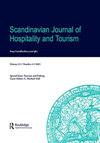欧洲游客打算重游同一个国家吗?对欧盟目的地满意度的影响
IF 3.6
4区 管理学
Q2 HOSPITALITY, LEISURE, SPORT & TOURISM
Scandinavian Journal of Hospitality and Tourism
Pub Date : 2020-08-07
DOI:10.1080/15022250.2020.1807405
引用次数: 18
摘要
摘要高水平的游客满意度是可持续旅游目的地最常见的目标之一。一般的假设是,游客满意度越高,游客对目的地的忠诚度就越高,而且还会增加重游次数。本文研究了满意度以及游客的人口统计学、动机和行为特征如何影响来年返回同一欧盟国家度假的意愿。我们使用具有二项式logit链接函数的广义线性模型(GLM)来揭示这些关系。结果表明,当欧盟公民决定重新访问同一国家时,对住宿质量的满意度起着重要作用。然而,游客的动机、年龄、旅行距离和原籍国对欧盟内重游意愿的影响比满意度更大。本文章由计算机程序翻译,如有差异,请以英文原文为准。
Do European tourists intend to revisit the same countries? Effect of satisfaction in European Union destinations
ABSTRACT A high level of tourist satisfaction is one of the most common goals of sustainable tourist destinations. The general assumption is that a higher level of tourist satisfaction leads to higher tourist loyalty to destinations and, furthermore, increases revisits. This paper examines the relationships of how satisfaction, as well as the demographic, motivational, and behavioural characteristics of tourists, affect the intention to return for the main holiday to the same European Union (EU) country in the following year. We used the generalized linear model (GLM) with binomial logit link functions to reveal these relationships. The results show that satisfaction with the quality of accommodation plays an important role when EU citizens make decisions to revisit the same country. However, tourists’ motivation, age, travel distance, and country of origin influence the intention to revisit within the EU more significantly than the satisfaction attributes.
求助全文
通过发布文献求助,成功后即可免费获取论文全文。
去求助
来源期刊
CiteScore
7.90
自引率
8.30%
发文量
14
期刊介绍:
Scandinavian Journal of Hospitality and Tourism is the leading Nordic journal for hospitality and tourism research. SJHT aims at initiating and stimulating high-impact and innovative research relevant for academics and practitioners within the hospitality and tourism industries. The journal takes an interdisciplinary approach including, but not limited to geography, psychology, sociology, history, anthropology, and economics. SJHT encourages research based on a variety of methods, including both qualitative and quantitative approaches. The journal covers all types of articles relevant to the Nordic region, as well as the North Atlantic, North Sea and Baltic regions. We also welcome reviews and conceptual articles with a broader geographical scope that clearly enhance the theoretical development of the hospitality and tourism field. In addition to research articles, we welcome research notes and book reviews. Published articles are the result of anonymous reviews by at least two referees chosen by the editors for their specialist knowledge.

 求助内容:
求助内容: 应助结果提醒方式:
应助结果提醒方式:


